Bulawayo residents resort to buying borehole water
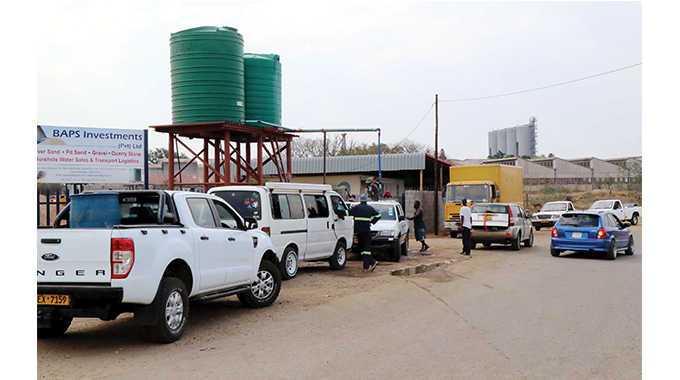
Nqobile Tshili/ Mashudu Netsianda, Chronicle Reporters
BULAWAYO residents are increasingly resorting to buying water from private suppliers with boreholes as the water crisis deepens in the city.
Most suburbs in Bulawayo have gone for more than a week without water increasing the desperation of the city’s residents.
On Tuesday all residential suburbs went dry following the interruption of the city’s water pumping system due to the annual maintenance by the Zimbabwe Electricity Transmission and Distribution Company (ZETDC) at Springs, Fernhill and Ncema pump stations.
Council is no longer adhering to the 144-hour weekly water shedding schedule and even after lifting the exercise more suburbs are no longer accessing water.
Long queues at various boreholes across the city have become the order of the day as council struggles to deliver water using water bowsers.
The deepening water crisis has seen some companies selling borehole water to residents.
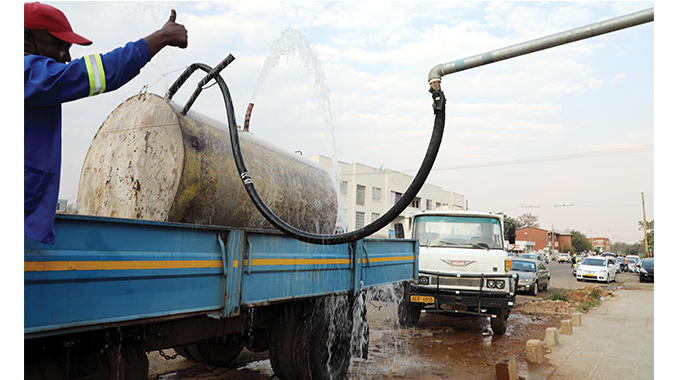
Workers at another one in the city centre fill up a bowser yesterday
A Chronicle news crew yesterday visited one of the companies selling water, BAPS Investment in Kelvin West near Dairibord Zimbabwe where several cars were queuing to buy water using huge containers.
1 000 litres of water costs US$2 or equivalent in local currency.
BAPS investment manager Mr Mobile Ndlovu said his company has been selling borehole water for years to mainly people building houses but of late, residents are buying it even for drinking.
“The water situation in Bulawayo is what has pushed more people to come and buy water from us. For instance, this morning, when we came in around 8AM, there were scores of people some carrying even 20 litre containers who wanted to buy water and we have been busy ever since that is why there are queues like this. I think most suburbs did not receive water,” said Mr Ndlovu.
He said selling water was not profitable for them as they were drawing water about 90 metres deep while using an electric pump, which is costly for them.
“For us at the moment it’s not about making profits but helping our fellow residents because people are desperate for water,” he said.
A resident who was filling his containers, Mr Tendai Sithole from Lobengula West, said the water crisis has forced him to buy water as council was no longer reliable.
He said he last had running water two weeks ago and had spent almost three hours queuing to buy water.
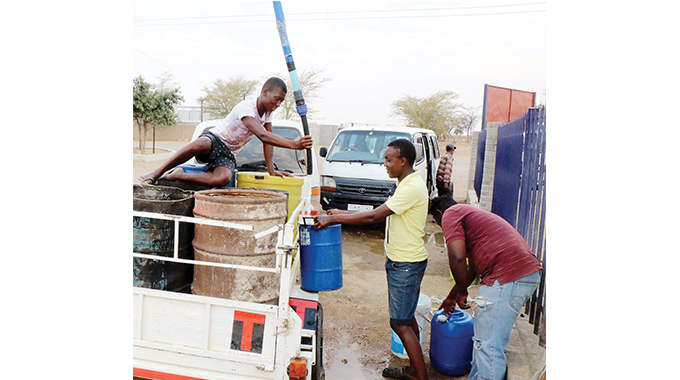
“I came here around 1PM but now it’s almost 3PM still in a queue to buy water. You can imagine what is happening in residential areas where people are fetching it for free. You will spend the whole day in a queue and that means all your business will stop,” said Mr Sithole stating that he buys the water twice a week.
Another resident, Mr Dumoluhle Moyo from Magwegwe West, said he stays in a high lying area which has gone for more than a month without receiving tap water.
He said the 1000 litres that he buys from BAPS lasts his family between five to seven days.
“Although we drink this water, we first treat it with water guard or boil it as we believe it might not be safe to just drink,” he said.
Bulawayo City Council (BCC) senior public relations Mrs Nesisa Mpofu said only licensed companies are allowed to sell borehole water in the city but not for drinking purposes.
“The sale of borehole water has been permitted for some registered companies in Bulawayo for non-potable use such as gardening and construction. This is because the use of municipal water is not permitted for these activities,” said Mrs Mpofu.
She said in cases where residents drink borehole water, it has to be boiled first.
Mrs Mpofu said council regulates the drilling of boreholes but could not immediately provide statistics on the number of boreholes that have been drilled across the city.
“The Bulawayo (Sewerage, Drainage and Water) By Law Statutory Instrument 390 of 1980 Borehole Use and Connection condition regulates the use of borehole water for potable use. We however encourage residents to not use borehole water for drinking or cooking. Should the need arise, they are encouraged to boil water before use,” said Mrs Mpofu.
She said in regulating the drilling of boreholes, council aims to ensure that boreholes do not interfere with its sewer and water infrastructure.
Mrs Mpofu said the borehole should be at least 30 metres away from septic tank.
A Chronicle news crew also visited selected suburbs in the western areas and observed queues for water at communal boreholes and unconventional wells.
In New Lobengula, some residents were fetching water from unhygienic water sources in swampy areas. Residents said due to the prevailing water crisis they were forced to queue at boreholes to fetch water.
“Although our taps have been dry for the past two weeks, we expected to receive supplies today, but there is nothing, and we understand the city’s entire residential areas have been affected,” said Ms Sazini Ndlovu of New Lobengula.
She said due to the prevailing water challenges, some residents resorted to digging for water in swamps, although the water is unhygienic.
Mrs Monica Sibanda of New Magwegwe said they had gone for more than two weeks without running water in the suburb.
“People are forced to crowd in one place to queue for water and this is a health time bomb. We are likely to have a disease outbreak to further compound our problems in light of Covid-19,” she said.
Residents in suburbs like Cowdray Park, Magwegwe West, Nkulumane and Emganwini that have been declared Covid-19 hotspots raised fears of contracting Covid-19 as social distancing is not maintained at communal boreholes.
Mr Lovemore Mhlanga of Lobengula West said they are now forced to resort to “bush toilets” to save the little available water secured from water bowsers or communal boreholes.
He said residents in high lying areas are now forced to rely on relatives staying in low lying areas where water supply is better.
Bulawayo Progressive Residents Association (BPRA) coordinator Mr Emmanuel Ndlovu said although they were aware of the dwindling water levels in the city’s supply dams, the situation was compounded by
BCC’s lack of commitment towards addressing water woes. He urged BCC to increase water bowsers in the worst affected areas.
Latest statistics indicate that in terms of water levels at the city’s water supply dams, Insiza Dam is 25, 69 percent full; Inyankuni 41, 50 percent and Lower Ncema 5,98 percent. Umzingwane Dam is at 3,05 percent, Upper Ncema is at 2 percent and Mtshabezi Dam 32,58 percent. The overall operational dam level is 23, 73 percent. — @mashnets

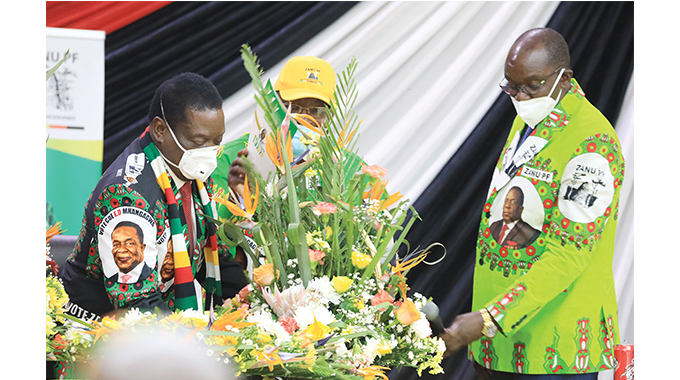
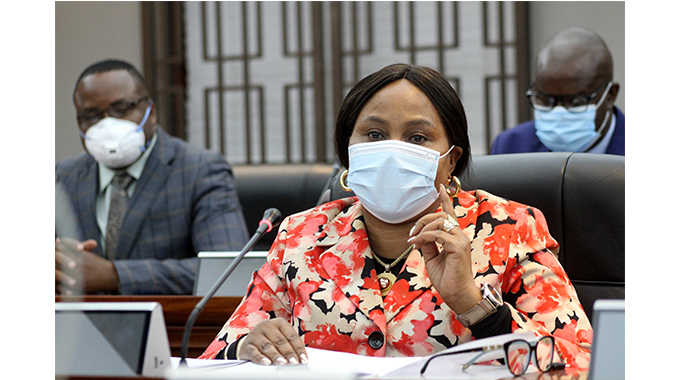
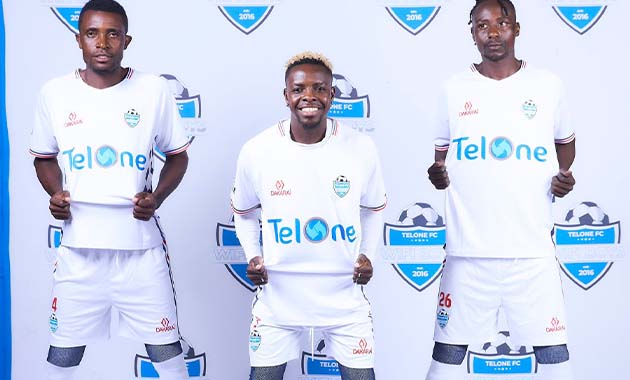
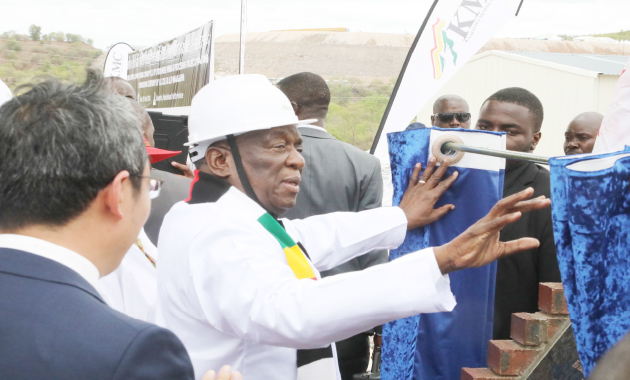
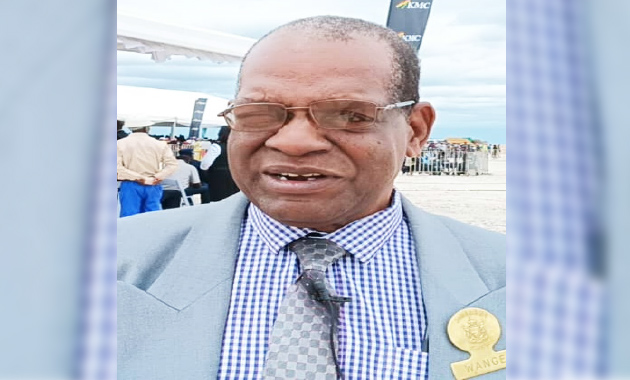


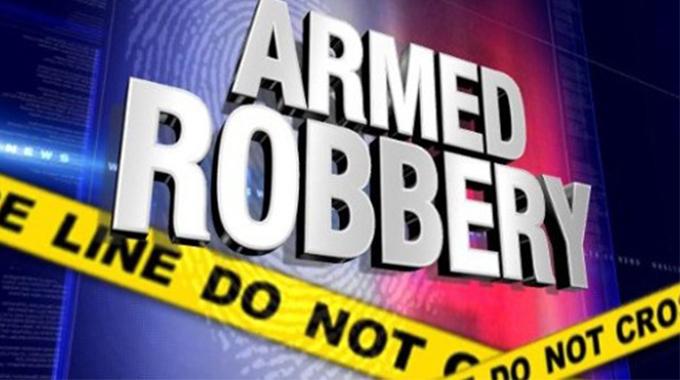



Comments